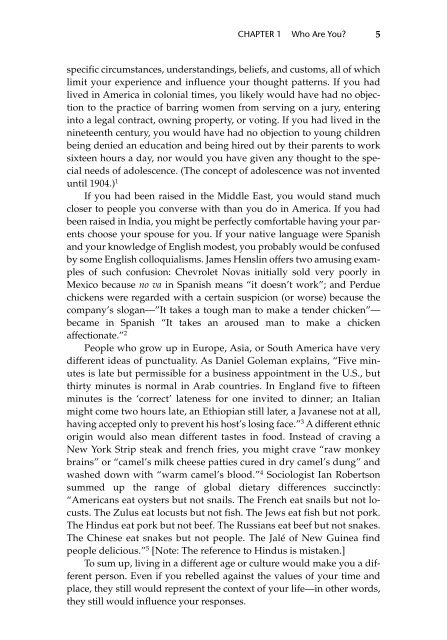Beyond Feelings
Beyond Feelings
Beyond Feelings
Create successful ePaper yourself
Turn your PDF publications into a flip-book with our unique Google optimized e-Paper software.
CHAPTER 1 Who Are You?<br />
specific circumstances, understandings, beliefs, and customs, all of which<br />
limit your experience and influence your thought patterns. If you had<br />
lived in America in colonial times, you likely would have had no objection<br />
to the practice of barring women from serving on a jury, entering<br />
into a legal contract, owning property, or voting. If you had lived in the<br />
nineteenth century, you would have had no objection to young children<br />
being denied an education and being hired out by their parents to work<br />
sixteen hours a day, nor would you have given any thought to the special<br />
needs of adolescence. (The concept of adolescence was not invented<br />
until 1904.) 1<br />
If you had been raised in the Middle East, you would stand much<br />
closer to people you converse with than you do in America. If you had<br />
been raised in India, you might be perfectly comfortable having your parents<br />
choose your spouse for you. If your native language were Spanish<br />
and your knowledge of English modest, you probably would be confused<br />
by some English colloquialisms. James Henslin offers two amusing examples<br />
of such confusion: Chevrolet Novas initially sold very poorly in<br />
Mexico because no va in Spanish means “it doesn’t work”; and Perdue<br />
chickens were regarded with a certain suspicion (or worse) because the<br />
company’s slogan—”It takes a tough man to make a tender chicken”—<br />
became in Spanish “It takes an aroused man to make a chicken<br />
affectionate.” 2<br />
People who grow up in Europe, Asia, or South America have very<br />
different ideas of punctuality. As Daniel Goleman explains, “Five minutes<br />
is late but permissible for a business appointment in the U.S., but<br />
thirty minutes is normal in Arab countries. In England five to fifteen<br />
minutes is the ‘correct’ lateness for one invited to dinner; an Italian<br />
might come two hours late, an Ethiopian still later, a Javanese not at all,<br />
having accepted only to prevent his host’s losing face.” 3 A different ethnic<br />
origin would also mean different tastes in food. Instead of craving a<br />
New York Strip steak and french fries, you might crave “raw monkey<br />
brains” or “camel’s milk cheese patties cured in dry camel’s dung” and<br />
washed down with “warm camel’s blood.” 4 Sociologist Ian Robertson<br />
summed up the range of global dietary differences succinctly:<br />
“Americans eat oysters but not snails. The French eat snails but not locusts.<br />
The Zulus eat locusts but not fish. The Jews eat fish but not pork.<br />
The Hindus eat pork but not beef. The Russians eat beef but not snakes.<br />
The Chinese eat snakes but not people. The Jalé of New Guinea find<br />
people delicious.” 5 [Note: The reference to Hindus is mistaken.]<br />
To sum up, living in a different age or culture would make you a different<br />
person. Even if you rebelled against the values of your time and<br />
place, they still would represent the context of your life—in other words,<br />
they still would influence your responses.<br />
5


